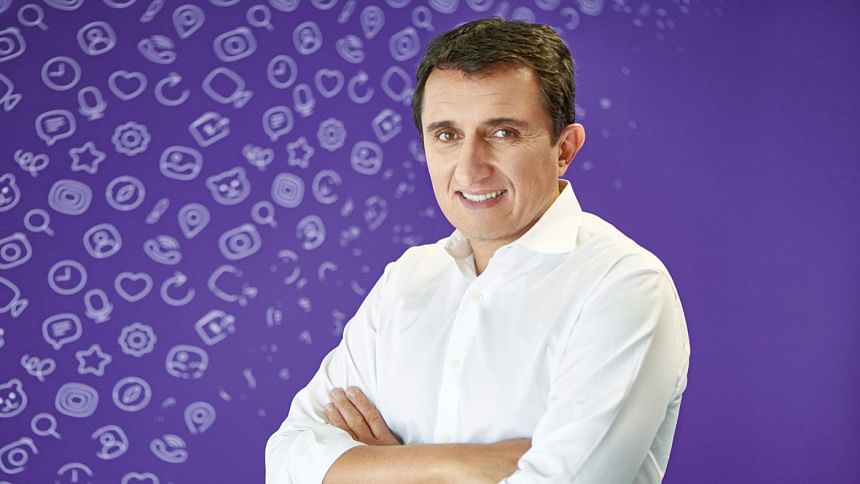Cutting ties with a giant: Viber CEO on Facebook relations and #StopHateForProfit

Since the United States erupted in a spate of protests against systemic racism and racial violence last May, a slew of companies have banded together and boycotted business ties with Facebook. With over 1100 companies joining in an attempt to deny Facebook ad revenue – companies like Honda of North America, CocaCola, CVS Health and more – the movement has tried to press home the message that Facebook as a platform and as a company needs to do more to curb the spread of hate speech. While their pullout has barely registered a dent in the social media giant's revenues, it shows a growing dissatisfaction with the way tech companies handle our increasingly digital social interactions and public discourses. To elaborate, Toggle reached out to another tech company that claims to do things a little differently. This week, Rakuten Viber CEO Djamel Agaoua answered our questions about the messaging platform cutting business ties with Facebook.
What led to Viber cutting ties with Facebook? What are the main reasons behind this decision?
We basically reached the point where Facebook policy and values were not compatible with Viber. It is in light of the fact the CEO and founder of Facebook Mark Zuckerberg said at a point that Facebook is not the arbiter of truth, and any kind of public speech -- even violent or sometimes racist -- could be posted on Facebook and they didn't have any role in moderating them. Since the killing of George Floyd in the US, a lot of public discussions were seen on Facebook, some of which were extremely violent and racist. All social networking platforms made the decision to moderate this kind of content. Facebook has a different policy -- they consider everybody to be free to post anything on their platform.
At Viber, we have a vision that our social responsibilities include blocking content that can be too violent or too racist because it hurts people. We understand "Freedom of Expression" and we try to respect this principle, but there are some limits, especially when rhetoric is too violent and too hurtful for other people. At Viber we are a very diverse company - all colours and religions are represented in our employee base and they were hurt Facebook's decision. So we came to the point where we could not maintain any business relationship with Facebook and this is the decision we made about six weeks ago.
Could you give us specifics of the move taken by Viber?
There are three consequences to this decision. The first one is to remove Facebook Connect from Viber, meaning users that used Facebook credentials to connect to Viber cannot do it anymore. The latest version of Viber on Android and IOS are now without Facebook Connect. We have decided to stop all advertising expenses on Facebook platforms indefinitely. The third one is related to Giphy, which Facebook acquired a few months ago. We have decided to remove Giphy as a GIF content platform for Viber users and to replace it with other partners.
Considering Facebook's products and platforms like Messenger and WhatsApp have their fair share of users worldwide, how would you respond to any critic who might say Viber's support of #StopHateForProfit is also commercially motivated?
Well, obviously anything we say or do related to Facebook could be interpreted this way but we used to work with Facebook on these topics and despite the fact we are competing. We have a long history at Viber of taking very clear positions around these topics. When the US administration decided to impose travel bans for seven weeks on a list of countries, we immediately decided to make all calls from the US to those countries —and vice versa— free, because there were people stuck in airports who couldn't get in or get out and couldn't reach their families. This is just one example among many that show Viber's values are not tactical moves that we make upon considering the situation. For the last ten years, we have shown our attachment to those values, our attachment to diversity, our attachment to privacy and security of the chats on Viber, and this is not related to competition.
Facebook has been known to cooperate with governments on occasion – does Viber have a policy of assisting government agencies when it comes to users being charged criminally? Does that policy change from one country to the other?
We respect the legislation, the rules & laws of all the countries we operate in. We, of course, comply with all those regulations, because we are a public company and this is what we have to do. One thing that needs to be clear is the fact that every exchange on Viber platforms are private exchanges -- chats and calls are protected by end to end encryption, which means that not even Viber staff can access the contents of a chat or call. So when we are required by authorities in the framework of legal operations, such as a subpoena from a legal court of justice, we deliver information we can deliver within the limits of our architecture -- the content of chats are not something we have access to. Respecting the rules and laws of the countries where you operate is obviously something that we have to do -- there are a couple of countries in the world where the rule of law does not allow Viber to operate, and we have decided not to operate in those countries.
How would you personally define free-speech? As a messaging platform, how does Viber approach censorship and self-expression, or strike a balance between the two?
It's a very important question and a very difficult one to answer. There is one aspect which is very important – the difference between private discussion and public discussions. At Viber, we consider private discussions are purely private and they must be secured, safe and respected. They cannot be accessed by anyone, they cannot be analysed for any purpose, not even commercial purposes.
When we talk about public discussions, in Viber we have some communities that are unlimited groups (with) an unlimited number of participants, which are done for public speeches/public discussions between people and communities of people or celebrities, politicians, brands etc. In those kinds of context, we consider any violent rhetoric, aggressive rhetoric, terrorist rhetoric or anything that could be targeting adults and are not appropriate for children in general, cannot stay on Viber. So we invest a lot of money and resources to analyse these content automatically, through artificial intelligence, and manually, through human beings, to check the content and either flag it or ban it. In some cases, we had to ban entire communities of people because they were not respecting our policies. It is a never-ending effort that we need to do because it's our role. We think we are part of a society where we also have a role to protect the people that are using our platforms.
On another note, Viber has a sizeable user-base in Bangladesh and the app caters to the local market specifically, with last year's rollout of a full Bangla UI. Does Viber have any new features in the works for users in Bangladesh?
We really think that Viber must be seen and perceived as a second home. And when you think about your home, it's a place where you speak the language, where you like the colours, where you find people that you know and content that you like. We work hard to make sure that some countries — important ones, and Bangladesh is one of them— have access to features where users are able to localise, customise, personalise the Viber experience to the culture, to the country, to the colours of the country to the content expected for the country. This is why we have decided to add a new language option last year for Bangladesh.
We will do more by adding local content providers, for instance, news providers are coming soon. We are working on a payment solution with a local partner to send money to each other. In the future in Bangladesh, just like in other countries, we will provide for brands and some local services the ability to create and deliver services within Viber. We are looking at chatbots so that banks and telecom services or insurance or an E-commerce company can provide their services through Viber.
Transcribed by Rahbar Al Haq.

 For all latest news, follow The Daily Star's Google News channel.
For all latest news, follow The Daily Star's Google News channel. 



Comments